Comparative Analysis of Nursing Education in Pakistan and the UK
VerifiedAdded on 2020/02/17
|13
|4235
|282
Essay
AI Summary
This essay provides a comparative analysis of nursing education systems in Pakistan and the United Kingdom. It begins by outlining the educational criteria and registration processes for nurses in both countries, including eligibility requirements and the roles of regulatory bodies such as the Pakistan Nursing Council and the Nursing and Midwifery Council (NMC) in the UK. The essay explores differences in curriculum, governmental support, and the financial aspects of nursing education, such as student loans in the UK. It also discusses the historical context of nursing education in Pakistan and the challenges faced in developing a standardized curriculum. The analysis evaluates the strengths and weaknesses of each system, considering factors like international comparisons, provincial autonomy in Pakistan, and the role of various educational bodies. The essay concludes with a reflection on the need for improvements in Pakistan's nursing education, including the incorporation of practical methodologies and the addressing of issues such as high migration of qualified nurses and political instability, while highlighting the importance of continuous professional development and training.
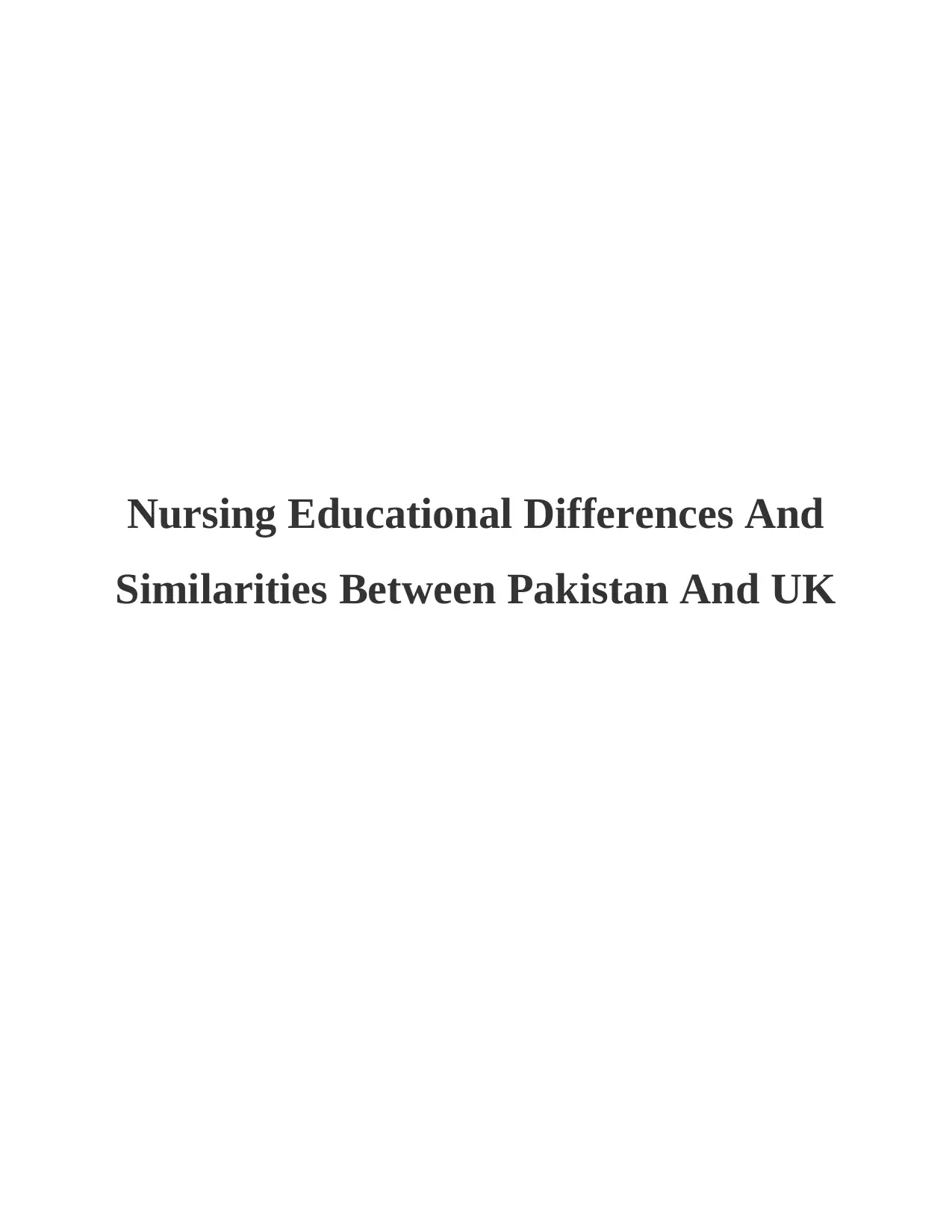
Nursing Educational Differences And
Similarities Between Pakistan And UK
Similarities Between Pakistan And UK
Paraphrase This Document
Need a fresh take? Get an instant paraphrase of this document with our AI Paraphraser
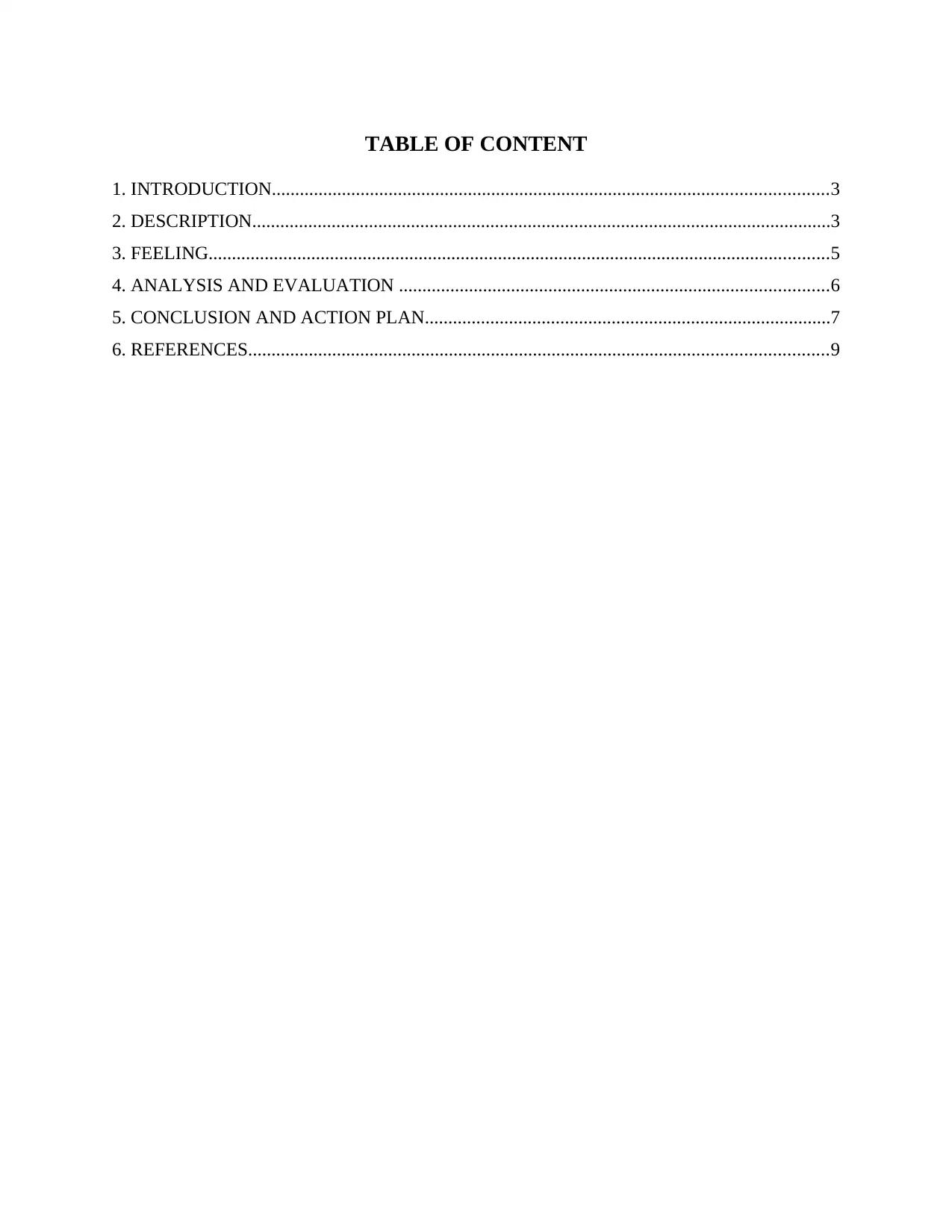
TABLE OF CONTENT
1. INTRODUCTION.......................................................................................................................3
2. DESCRIPTION............................................................................................................................3
3. FEELING.....................................................................................................................................5
4. ANALYSIS AND EVALUATION ............................................................................................6
5. CONCLUSION AND ACTION PLAN.......................................................................................7
6. REFERENCES............................................................................................................................9
1. INTRODUCTION.......................................................................................................................3
2. DESCRIPTION............................................................................................................................3
3. FEELING.....................................................................................................................................5
4. ANALYSIS AND EVALUATION ............................................................................................6
5. CONCLUSION AND ACTION PLAN.......................................................................................7
6. REFERENCES............................................................................................................................9
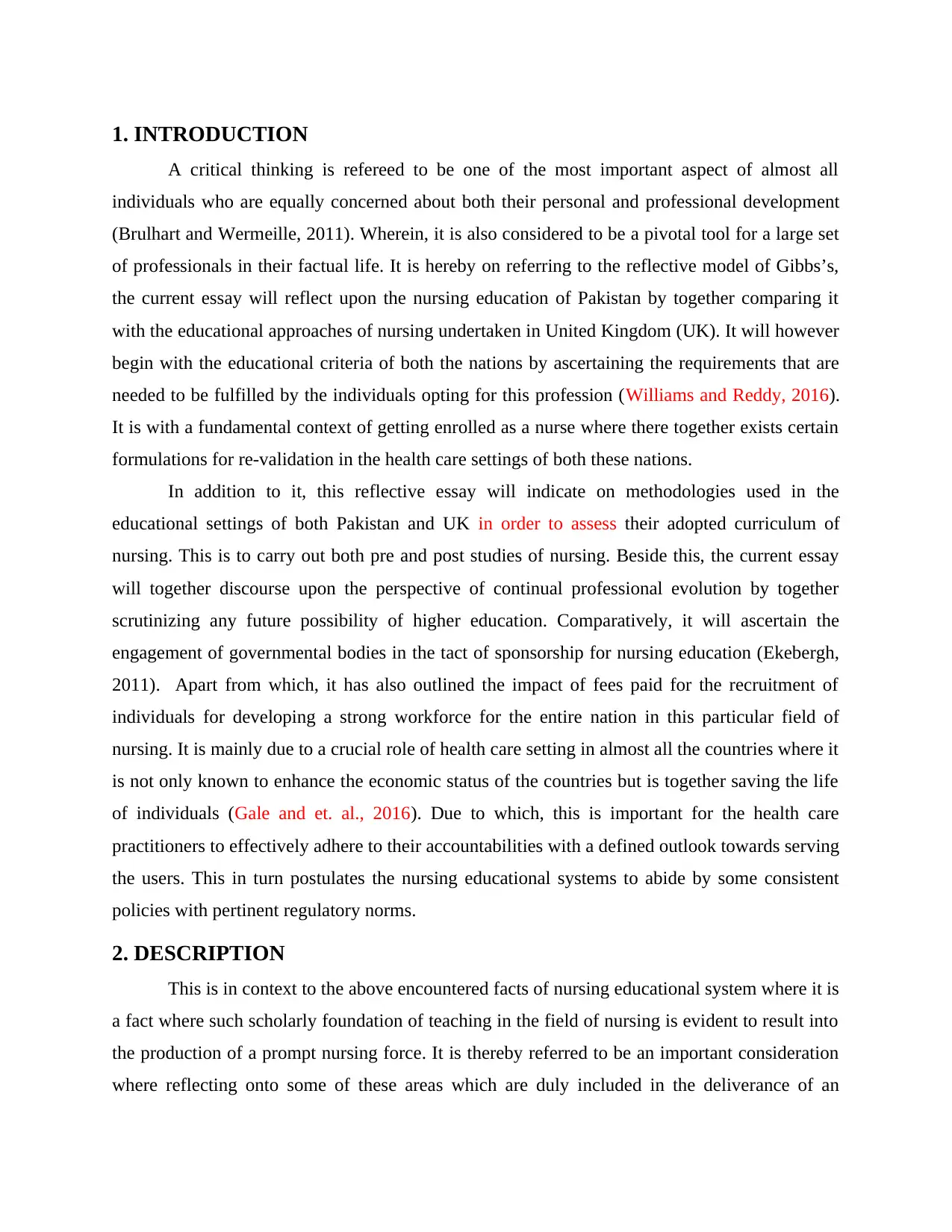
1. INTRODUCTION
A critical thinking is refereed to be one of the most important aspect of almost all
individuals who are equally concerned about both their personal and professional development
(Brulhart and Wermeille, 2011). Wherein, it is also considered to be a pivotal tool for a large set
of professionals in their factual life. It is hereby on referring to the reflective model of Gibbs’s,
the current essay will reflect upon the nursing education of Pakistan by together comparing it
with the educational approaches of nursing undertaken in United Kingdom (UK). It will however
begin with the educational criteria of both the nations by ascertaining the requirements that are
needed to be fulfilled by the individuals opting for this profession (Williams and Reddy, 2016).
It is with a fundamental context of getting enrolled as a nurse where there together exists certain
formulations for re-validation in the health care settings of both these nations.
In addition to it, this reflective essay will indicate on methodologies used in the
educational settings of both Pakistan and UK in order to assess their adopted curriculum of
nursing. This is to carry out both pre and post studies of nursing. Beside this, the current essay
will together discourse upon the perspective of continual professional evolution by together
scrutinizing any future possibility of higher education. Comparatively, it will ascertain the
engagement of governmental bodies in the tact of sponsorship for nursing education (Ekebergh,
2011). Apart from which, it has also outlined the impact of fees paid for the recruitment of
individuals for developing a strong workforce for the entire nation in this particular field of
nursing. It is mainly due to a crucial role of health care setting in almost all the countries where it
is not only known to enhance the economic status of the countries but is together saving the life
of individuals (Gale and et. al., 2016). Due to which, this is important for the health care
practitioners to effectively adhere to their accountabilities with a defined outlook towards serving
the users. This in turn postulates the nursing educational systems to abide by some consistent
policies with pertinent regulatory norms.
2. DESCRIPTION
This is in context to the above encountered facts of nursing educational system where it is
a fact where such scholarly foundation of teaching in the field of nursing is evident to result into
the production of a prompt nursing force. It is thereby referred to be an important consideration
where reflecting onto some of these areas which are duly included in the deliverance of an
A critical thinking is refereed to be one of the most important aspect of almost all
individuals who are equally concerned about both their personal and professional development
(Brulhart and Wermeille, 2011). Wherein, it is also considered to be a pivotal tool for a large set
of professionals in their factual life. It is hereby on referring to the reflective model of Gibbs’s,
the current essay will reflect upon the nursing education of Pakistan by together comparing it
with the educational approaches of nursing undertaken in United Kingdom (UK). It will however
begin with the educational criteria of both the nations by ascertaining the requirements that are
needed to be fulfilled by the individuals opting for this profession (Williams and Reddy, 2016).
It is with a fundamental context of getting enrolled as a nurse where there together exists certain
formulations for re-validation in the health care settings of both these nations.
In addition to it, this reflective essay will indicate on methodologies used in the
educational settings of both Pakistan and UK in order to assess their adopted curriculum of
nursing. This is to carry out both pre and post studies of nursing. Beside this, the current essay
will together discourse upon the perspective of continual professional evolution by together
scrutinizing any future possibility of higher education. Comparatively, it will ascertain the
engagement of governmental bodies in the tact of sponsorship for nursing education (Ekebergh,
2011). Apart from which, it has also outlined the impact of fees paid for the recruitment of
individuals for developing a strong workforce for the entire nation in this particular field of
nursing. It is mainly due to a crucial role of health care setting in almost all the countries where it
is not only known to enhance the economic status of the countries but is together saving the life
of individuals (Gale and et. al., 2016). Due to which, this is important for the health care
practitioners to effectively adhere to their accountabilities with a defined outlook towards serving
the users. This in turn postulates the nursing educational systems to abide by some consistent
policies with pertinent regulatory norms.
2. DESCRIPTION
This is in context to the above encountered facts of nursing educational system where it is
a fact where such scholarly foundation of teaching in the field of nursing is evident to result into
the production of a prompt nursing force. It is thereby referred to be an important consideration
where reflecting onto some of these areas which are duly included in the deliverance of an
⊘ This is a preview!⊘
Do you want full access?
Subscribe today to unlock all pages.

Trusted by 1+ million students worldwide
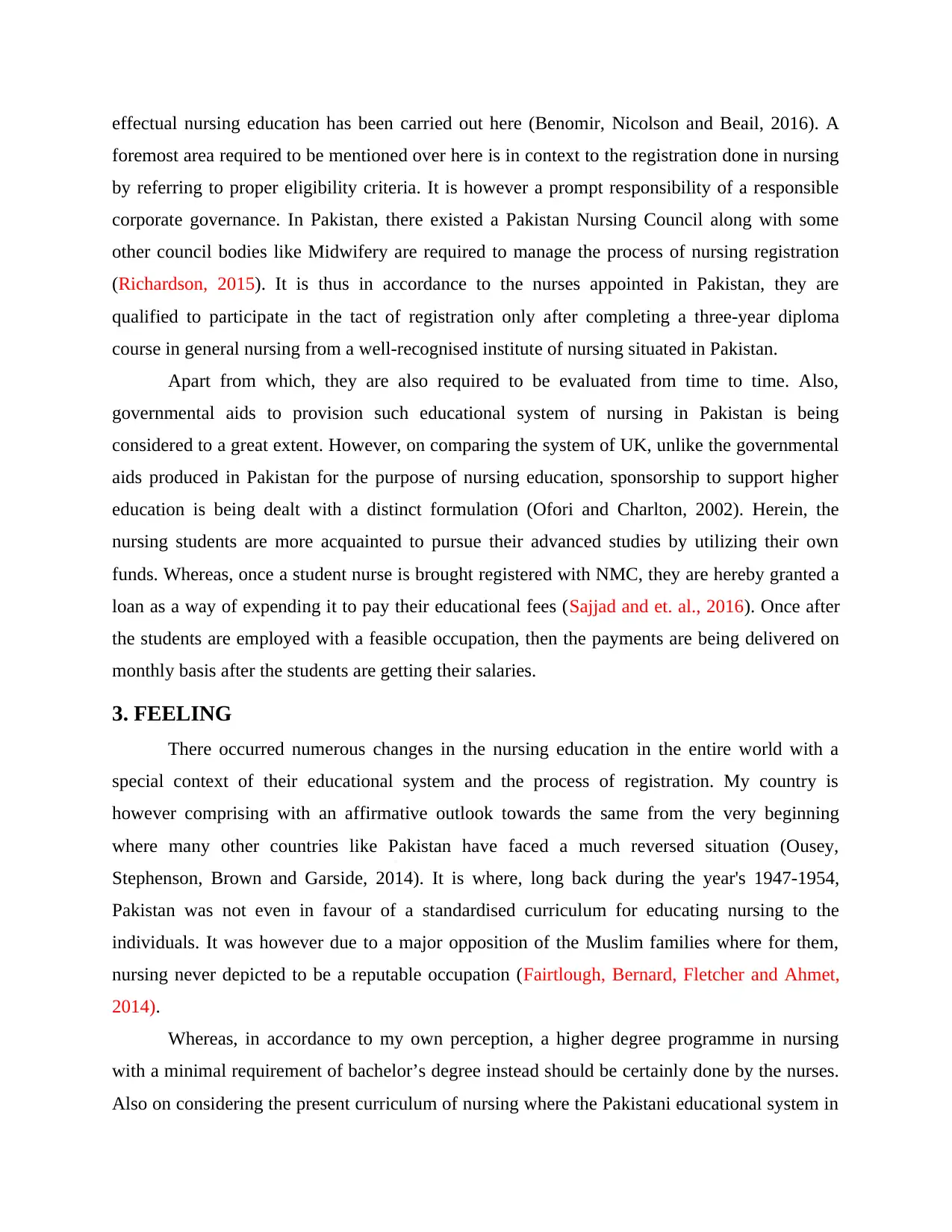
effectual nursing education has been carried out here (Benomir, Nicolson and Beail, 2016). A
foremost area required to be mentioned over here is in context to the registration done in nursing
by referring to proper eligibility criteria. It is however a prompt responsibility of a responsible
corporate governance. In Pakistan, there existed a Pakistan Nursing Council along with some
other council bodies like Midwifery are required to manage the process of nursing registration
(Richardson, 2015). It is thus in accordance to the nurses appointed in Pakistan, they are
qualified to participate in the tact of registration only after completing a three-year diploma
course in general nursing from a well-recognised institute of nursing situated in Pakistan.
Apart from which, they are also required to be evaluated from time to time. Also,
governmental aids to provision such educational system of nursing in Pakistan is being
considered to a great extent. However, on comparing the system of UK, unlike the governmental
aids produced in Pakistan for the purpose of nursing education, sponsorship to support higher
education is being dealt with a distinct formulation (Ofori and Charlton, 2002). Herein, the
nursing students are more acquainted to pursue their advanced studies by utilizing their own
funds. Whereas, once a student nurse is brought registered with NMC, they are hereby granted a
loan as a way of expending it to pay their educational fees (Sajjad and et. al., 2016). Once after
the students are employed with a feasible occupation, then the payments are being delivered on
monthly basis after the students are getting their salaries.
3. FEELING
There occurred numerous changes in the nursing education in the entire world with a
special context of their educational system and the process of registration. My country is
however comprising with an affirmative outlook towards the same from the very beginning
where many other countries like Pakistan have faced a much reversed situation (Ousey,
Stephenson, Brown and Garside, 2014). It is where, long back during the year's 1947-1954,
Pakistan was not even in favour of a standardised curriculum for educating nursing to the
individuals. It was however due to a major opposition of the Muslim families where for them,
nursing never depicted to be a reputable occupation (Fairtlough, Bernard, Fletcher and Ahmet,
2014).
Whereas, in accordance to my own perception, a higher degree programme in nursing
with a minimal requirement of bachelor’s degree instead should be certainly done by the nurses.
Also on considering the present curriculum of nursing where the Pakistani educational system in
foremost area required to be mentioned over here is in context to the registration done in nursing
by referring to proper eligibility criteria. It is however a prompt responsibility of a responsible
corporate governance. In Pakistan, there existed a Pakistan Nursing Council along with some
other council bodies like Midwifery are required to manage the process of nursing registration
(Richardson, 2015). It is thus in accordance to the nurses appointed in Pakistan, they are
qualified to participate in the tact of registration only after completing a three-year diploma
course in general nursing from a well-recognised institute of nursing situated in Pakistan.
Apart from which, they are also required to be evaluated from time to time. Also,
governmental aids to provision such educational system of nursing in Pakistan is being
considered to a great extent. However, on comparing the system of UK, unlike the governmental
aids produced in Pakistan for the purpose of nursing education, sponsorship to support higher
education is being dealt with a distinct formulation (Ofori and Charlton, 2002). Herein, the
nursing students are more acquainted to pursue their advanced studies by utilizing their own
funds. Whereas, once a student nurse is brought registered with NMC, they are hereby granted a
loan as a way of expending it to pay their educational fees (Sajjad and et. al., 2016). Once after
the students are employed with a feasible occupation, then the payments are being delivered on
monthly basis after the students are getting their salaries.
3. FEELING
There occurred numerous changes in the nursing education in the entire world with a
special context of their educational system and the process of registration. My country is
however comprising with an affirmative outlook towards the same from the very beginning
where many other countries like Pakistan have faced a much reversed situation (Ousey,
Stephenson, Brown and Garside, 2014). It is where, long back during the year's 1947-1954,
Pakistan was not even in favour of a standardised curriculum for educating nursing to the
individuals. It was however due to a major opposition of the Muslim families where for them,
nursing never depicted to be a reputable occupation (Fairtlough, Bernard, Fletcher and Ahmet,
2014).
Whereas, in accordance to my own perception, a higher degree programme in nursing
with a minimal requirement of bachelor’s degree instead should be certainly done by the nurses.
Also on considering the present curriculum of nursing where the Pakistani educational system in
Paraphrase This Document
Need a fresh take? Get an instant paraphrase of this document with our AI Paraphraser
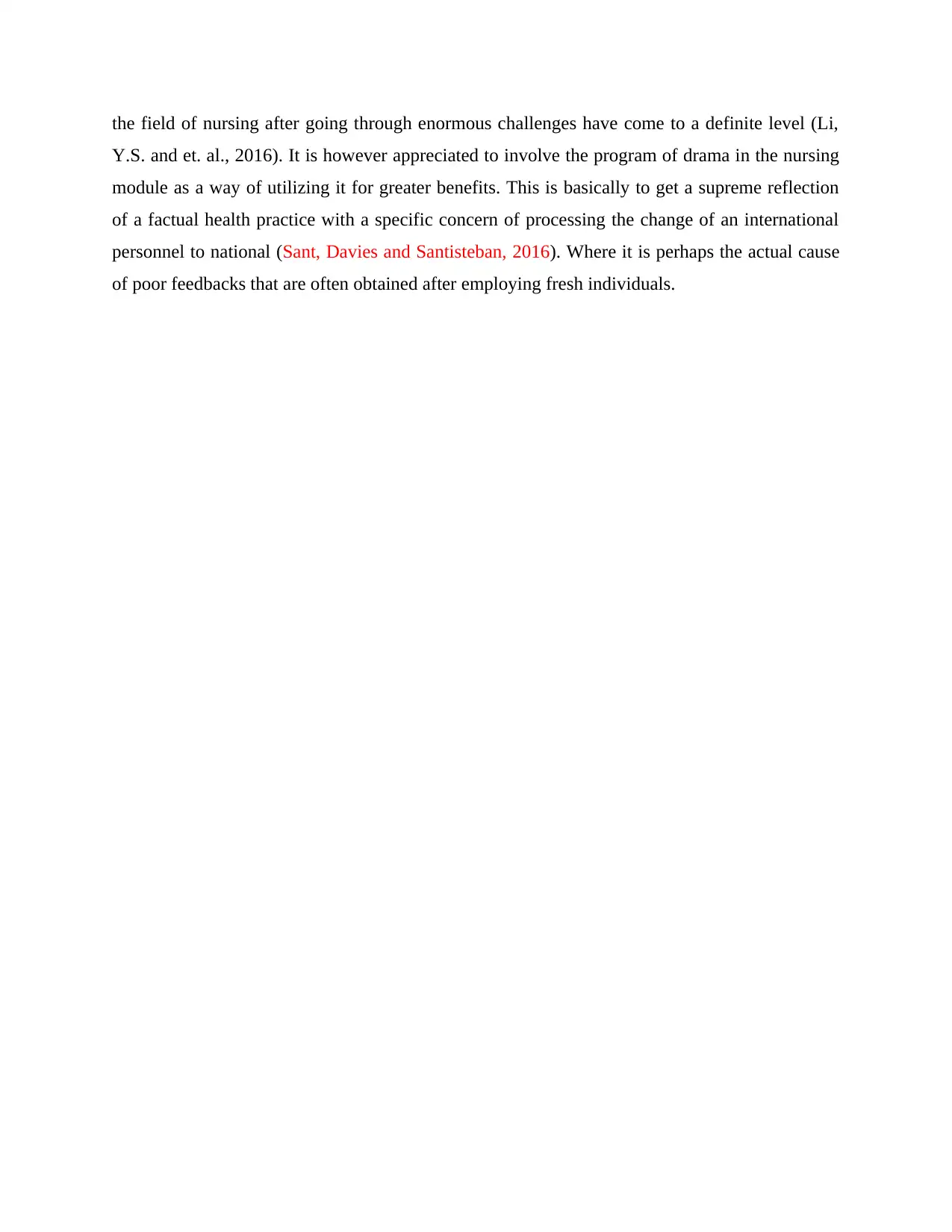
the field of nursing after going through enormous challenges have come to a definite level (Li,
Y.S. and et. al., 2016). It is however appreciated to involve the program of drama in the nursing
module as a way of utilizing it for greater benefits. This is basically to get a supreme reflection
of a factual health practice with a specific concern of processing the change of an international
personnel to national (Sant, Davies and Santisteban, 2016). Where it is perhaps the actual cause
of poor feedbacks that are often obtained after employing fresh individuals.
Y.S. and et. al., 2016). It is however appreciated to involve the program of drama in the nursing
module as a way of utilizing it for greater benefits. This is basically to get a supreme reflection
of a factual health practice with a specific concern of processing the change of an international
personnel to national (Sant, Davies and Santisteban, 2016). Where it is perhaps the actual cause
of poor feedbacks that are often obtained after employing fresh individuals.
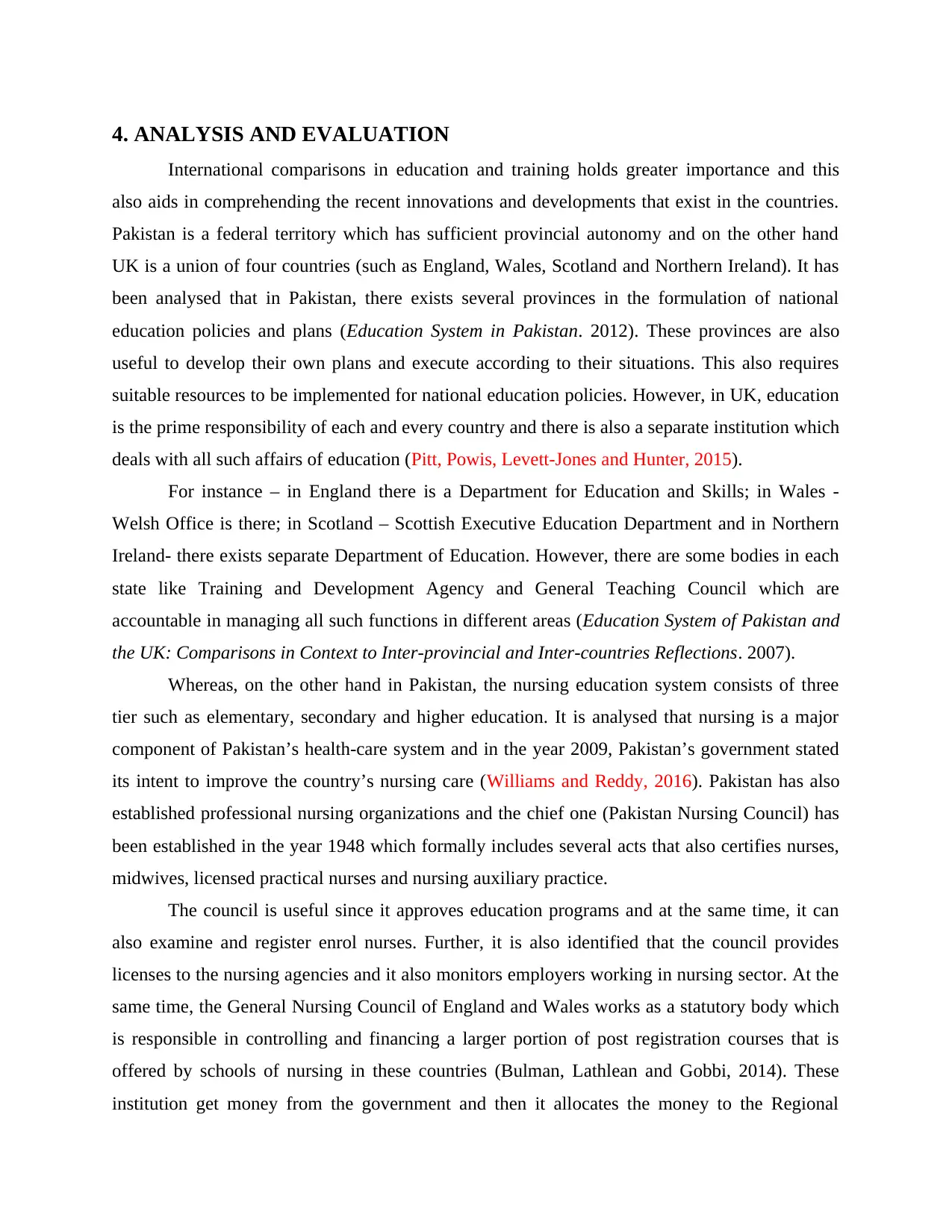
4. ANALYSIS AND EVALUATION
International comparisons in education and training holds greater importance and this
also aids in comprehending the recent innovations and developments that exist in the countries.
Pakistan is a federal territory which has sufficient provincial autonomy and on the other hand
UK is a union of four countries (such as England, Wales, Scotland and Northern Ireland). It has
been analysed that in Pakistan, there exists several provinces in the formulation of national
education policies and plans (Education System in Pakistan. 2012). These provinces are also
useful to develop their own plans and execute according to their situations. This also requires
suitable resources to be implemented for national education policies. However, in UK, education
is the prime responsibility of each and every country and there is also a separate institution which
deals with all such affairs of education (Pitt, Powis, Levett-Jones and Hunter, 2015).
For instance – in England there is a Department for Education and Skills; in Wales -
Welsh Office is there; in Scotland – Scottish Executive Education Department and in Northern
Ireland- there exists separate Department of Education. However, there are some bodies in each
state like Training and Development Agency and General Teaching Council which are
accountable in managing all such functions in different areas (Education System of Pakistan and
the UK: Comparisons in Context to Inter-provincial and Inter-countries Reflections. 2007).
Whereas, on the other hand in Pakistan, the nursing education system consists of three
tier such as elementary, secondary and higher education. It is analysed that nursing is a major
component of Pakistan’s health-care system and in the year 2009, Pakistan’s government stated
its intent to improve the country’s nursing care (Williams and Reddy, 2016). Pakistan has also
established professional nursing organizations and the chief one (Pakistan Nursing Council) has
been established in the year 1948 which formally includes several acts that also certifies nurses,
midwives, licensed practical nurses and nursing auxiliary practice.
The council is useful since it approves education programs and at the same time, it can
also examine and register enrol nurses. Further, it is also identified that the council provides
licenses to the nursing agencies and it also monitors employers working in nursing sector. At the
same time, the General Nursing Council of England and Wales works as a statutory body which
is responsible in controlling and financing a larger portion of post registration courses that is
offered by schools of nursing in these countries (Bulman, Lathlean and Gobbi, 2014). These
institution get money from the government and then it allocates the money to the Regional
International comparisons in education and training holds greater importance and this
also aids in comprehending the recent innovations and developments that exist in the countries.
Pakistan is a federal territory which has sufficient provincial autonomy and on the other hand
UK is a union of four countries (such as England, Wales, Scotland and Northern Ireland). It has
been analysed that in Pakistan, there exists several provinces in the formulation of national
education policies and plans (Education System in Pakistan. 2012). These provinces are also
useful to develop their own plans and execute according to their situations. This also requires
suitable resources to be implemented for national education policies. However, in UK, education
is the prime responsibility of each and every country and there is also a separate institution which
deals with all such affairs of education (Pitt, Powis, Levett-Jones and Hunter, 2015).
For instance – in England there is a Department for Education and Skills; in Wales -
Welsh Office is there; in Scotland – Scottish Executive Education Department and in Northern
Ireland- there exists separate Department of Education. However, there are some bodies in each
state like Training and Development Agency and General Teaching Council which are
accountable in managing all such functions in different areas (Education System of Pakistan and
the UK: Comparisons in Context to Inter-provincial and Inter-countries Reflections. 2007).
Whereas, on the other hand in Pakistan, the nursing education system consists of three
tier such as elementary, secondary and higher education. It is analysed that nursing is a major
component of Pakistan’s health-care system and in the year 2009, Pakistan’s government stated
its intent to improve the country’s nursing care (Williams and Reddy, 2016). Pakistan has also
established professional nursing organizations and the chief one (Pakistan Nursing Council) has
been established in the year 1948 which formally includes several acts that also certifies nurses,
midwives, licensed practical nurses and nursing auxiliary practice.
The council is useful since it approves education programs and at the same time, it can
also examine and register enrol nurses. Further, it is also identified that the council provides
licenses to the nursing agencies and it also monitors employers working in nursing sector. At the
same time, the General Nursing Council of England and Wales works as a statutory body which
is responsible in controlling and financing a larger portion of post registration courses that is
offered by schools of nursing in these countries (Bulman, Lathlean and Gobbi, 2014). These
institution get money from the government and then it allocates the money to the Regional
⊘ This is a preview!⊘
Do you want full access?
Subscribe today to unlock all pages.

Trusted by 1+ million students worldwide
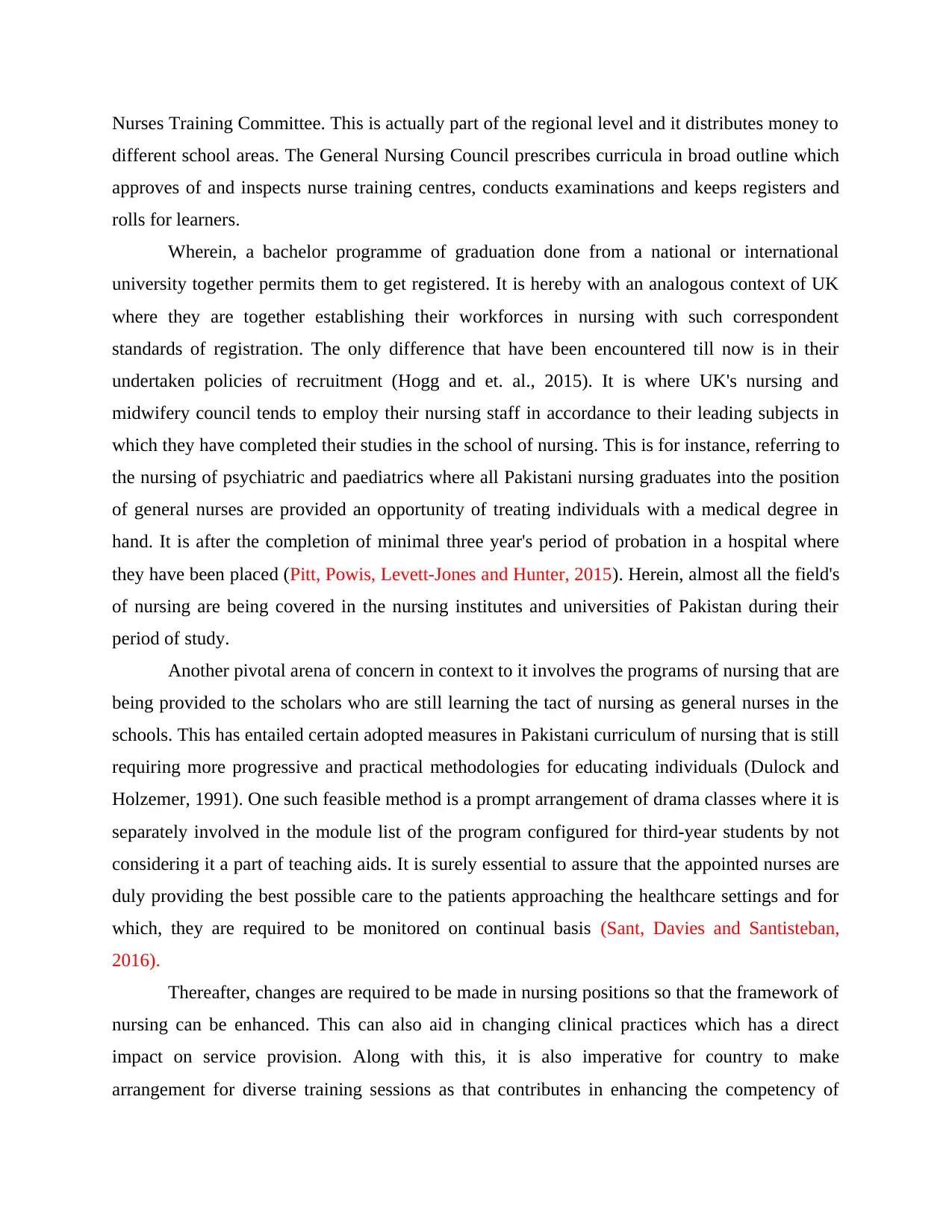
Nurses Training Committee. This is actually part of the regional level and it distributes money to
different school areas. The General Nursing Council prescribes curricula in broad outline which
approves of and inspects nurse training centres, conducts examinations and keeps registers and
rolls for learners.
Wherein, a bachelor programme of graduation done from a national or international
university together permits them to get registered. It is hereby with an analogous context of UK
where they are together establishing their workforces in nursing with such correspondent
standards of registration. The only difference that have been encountered till now is in their
undertaken policies of recruitment (Hogg and et. al., 2015). It is where UK's nursing and
midwifery council tends to employ their nursing staff in accordance to their leading subjects in
which they have completed their studies in the school of nursing. This is for instance, referring to
the nursing of psychiatric and paediatrics where all Pakistani nursing graduates into the position
of general nurses are provided an opportunity of treating individuals with a medical degree in
hand. It is after the completion of minimal three year's period of probation in a hospital where
they have been placed (Pitt, Powis, Levett-Jones and Hunter, 2015). Herein, almost all the field's
of nursing are being covered in the nursing institutes and universities of Pakistan during their
period of study.
Another pivotal arena of concern in context to it involves the programs of nursing that are
being provided to the scholars who are still learning the tact of nursing as general nurses in the
schools. This has entailed certain adopted measures in Pakistani curriculum of nursing that is still
requiring more progressive and practical methodologies for educating individuals (Dulock and
Holzemer, 1991). One such feasible method is a prompt arrangement of drama classes where it is
separately involved in the module list of the program configured for third-year students by not
considering it a part of teaching aids. It is surely essential to assure that the appointed nurses are
duly providing the best possible care to the patients approaching the healthcare settings and for
which, they are required to be monitored on continual basis (Sant, Davies and Santisteban,
2016).
Thereafter, changes are required to be made in nursing positions so that the framework of
nursing can be enhanced. This can also aid in changing clinical practices which has a direct
impact on service provision. Along with this, it is also imperative for country to make
arrangement for diverse training sessions as that contributes in enhancing the competency of
different school areas. The General Nursing Council prescribes curricula in broad outline which
approves of and inspects nurse training centres, conducts examinations and keeps registers and
rolls for learners.
Wherein, a bachelor programme of graduation done from a national or international
university together permits them to get registered. It is hereby with an analogous context of UK
where they are together establishing their workforces in nursing with such correspondent
standards of registration. The only difference that have been encountered till now is in their
undertaken policies of recruitment (Hogg and et. al., 2015). It is where UK's nursing and
midwifery council tends to employ their nursing staff in accordance to their leading subjects in
which they have completed their studies in the school of nursing. This is for instance, referring to
the nursing of psychiatric and paediatrics where all Pakistani nursing graduates into the position
of general nurses are provided an opportunity of treating individuals with a medical degree in
hand. It is after the completion of minimal three year's period of probation in a hospital where
they have been placed (Pitt, Powis, Levett-Jones and Hunter, 2015). Herein, almost all the field's
of nursing are being covered in the nursing institutes and universities of Pakistan during their
period of study.
Another pivotal arena of concern in context to it involves the programs of nursing that are
being provided to the scholars who are still learning the tact of nursing as general nurses in the
schools. This has entailed certain adopted measures in Pakistani curriculum of nursing that is still
requiring more progressive and practical methodologies for educating individuals (Dulock and
Holzemer, 1991). One such feasible method is a prompt arrangement of drama classes where it is
separately involved in the module list of the program configured for third-year students by not
considering it a part of teaching aids. It is surely essential to assure that the appointed nurses are
duly providing the best possible care to the patients approaching the healthcare settings and for
which, they are required to be monitored on continual basis (Sant, Davies and Santisteban,
2016).
Thereafter, changes are required to be made in nursing positions so that the framework of
nursing can be enhanced. This can also aid in changing clinical practices which has a direct
impact on service provision. Along with this, it is also imperative for country to make
arrangement for diverse training sessions as that contributes in enhancing the competency of
Paraphrase This Document
Need a fresh take? Get an instant paraphrase of this document with our AI Paraphraser
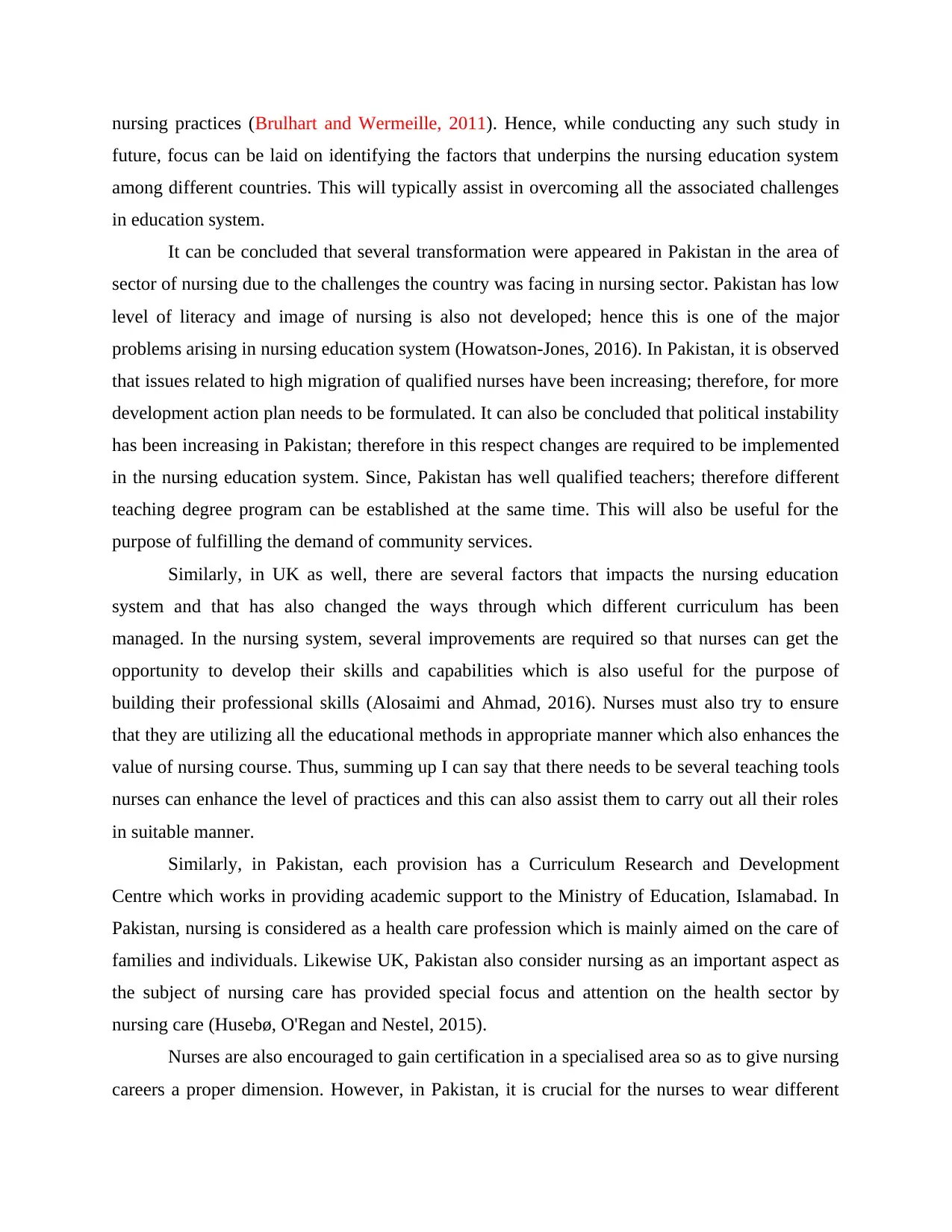
nursing practices (Brulhart and Wermeille, 2011). Hence, while conducting any such study in
future, focus can be laid on identifying the factors that underpins the nursing education system
among different countries. This will typically assist in overcoming all the associated challenges
in education system.
It can be concluded that several transformation were appeared in Pakistan in the area of
sector of nursing due to the challenges the country was facing in nursing sector. Pakistan has low
level of literacy and image of nursing is also not developed; hence this is one of the major
problems arising in nursing education system (Howatson-Jones, 2016). In Pakistan, it is observed
that issues related to high migration of qualified nurses have been increasing; therefore, for more
development action plan needs to be formulated. It can also be concluded that political instability
has been increasing in Pakistan; therefore in this respect changes are required to be implemented
in the nursing education system. Since, Pakistan has well qualified teachers; therefore different
teaching degree program can be established at the same time. This will also be useful for the
purpose of fulfilling the demand of community services.
Similarly, in UK as well, there are several factors that impacts the nursing education
system and that has also changed the ways through which different curriculum has been
managed. In the nursing system, several improvements are required so that nurses can get the
opportunity to develop their skills and capabilities which is also useful for the purpose of
building their professional skills (Alosaimi and Ahmad, 2016). Nurses must also try to ensure
that they are utilizing all the educational methods in appropriate manner which also enhances the
value of nursing course. Thus, summing up I can say that there needs to be several teaching tools
nurses can enhance the level of practices and this can also assist them to carry out all their roles
in suitable manner.
Similarly, in Pakistan, each provision has a Curriculum Research and Development
Centre which works in providing academic support to the Ministry of Education, Islamabad. In
Pakistan, nursing is considered as a health care profession which is mainly aimed on the care of
families and individuals. Likewise UK, Pakistan also consider nursing as an important aspect as
the subject of nursing care has provided special focus and attention on the health sector by
nursing care (Husebø, O'Regan and Nestel, 2015).
Nurses are also encouraged to gain certification in a specialised area so as to give nursing
careers a proper dimension. However, in Pakistan, it is crucial for the nurses to wear different
future, focus can be laid on identifying the factors that underpins the nursing education system
among different countries. This will typically assist in overcoming all the associated challenges
in education system.
It can be concluded that several transformation were appeared in Pakistan in the area of
sector of nursing due to the challenges the country was facing in nursing sector. Pakistan has low
level of literacy and image of nursing is also not developed; hence this is one of the major
problems arising in nursing education system (Howatson-Jones, 2016). In Pakistan, it is observed
that issues related to high migration of qualified nurses have been increasing; therefore, for more
development action plan needs to be formulated. It can also be concluded that political instability
has been increasing in Pakistan; therefore in this respect changes are required to be implemented
in the nursing education system. Since, Pakistan has well qualified teachers; therefore different
teaching degree program can be established at the same time. This will also be useful for the
purpose of fulfilling the demand of community services.
Similarly, in UK as well, there are several factors that impacts the nursing education
system and that has also changed the ways through which different curriculum has been
managed. In the nursing system, several improvements are required so that nurses can get the
opportunity to develop their skills and capabilities which is also useful for the purpose of
building their professional skills (Alosaimi and Ahmad, 2016). Nurses must also try to ensure
that they are utilizing all the educational methods in appropriate manner which also enhances the
value of nursing course. Thus, summing up I can say that there needs to be several teaching tools
nurses can enhance the level of practices and this can also assist them to carry out all their roles
in suitable manner.
Similarly, in Pakistan, each provision has a Curriculum Research and Development
Centre which works in providing academic support to the Ministry of Education, Islamabad. In
Pakistan, nursing is considered as a health care profession which is mainly aimed on the care of
families and individuals. Likewise UK, Pakistan also consider nursing as an important aspect as
the subject of nursing care has provided special focus and attention on the health sector by
nursing care (Husebø, O'Regan and Nestel, 2015).
Nurses are also encouraged to gain certification in a specialised area so as to give nursing
careers a proper dimension. However, in Pakistan, it is crucial for the nurses to wear different
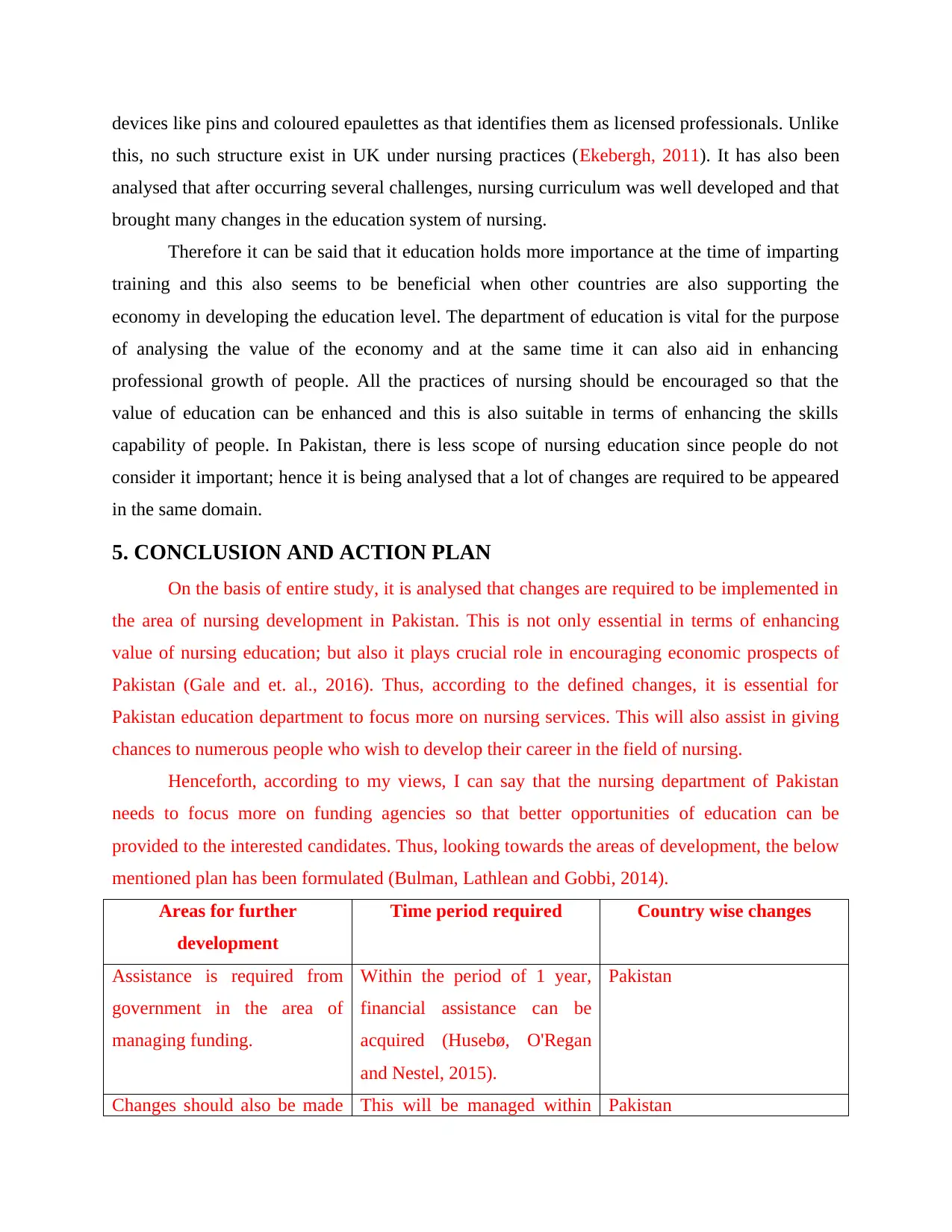
devices like pins and coloured epaulettes as that identifies them as licensed professionals. Unlike
this, no such structure exist in UK under nursing practices (Ekebergh, 2011). It has also been
analysed that after occurring several challenges, nursing curriculum was well developed and that
brought many changes in the education system of nursing.
Therefore it can be said that it education holds more importance at the time of imparting
training and this also seems to be beneficial when other countries are also supporting the
economy in developing the education level. The department of education is vital for the purpose
of analysing the value of the economy and at the same time it can also aid in enhancing
professional growth of people. All the practices of nursing should be encouraged so that the
value of education can be enhanced and this is also suitable in terms of enhancing the skills
capability of people. In Pakistan, there is less scope of nursing education since people do not
consider it important; hence it is being analysed that a lot of changes are required to be appeared
in the same domain.
5. CONCLUSION AND ACTION PLAN
On the basis of entire study, it is analysed that changes are required to be implemented in
the area of nursing development in Pakistan. This is not only essential in terms of enhancing
value of nursing education; but also it plays crucial role in encouraging economic prospects of
Pakistan (Gale and et. al., 2016). Thus, according to the defined changes, it is essential for
Pakistan education department to focus more on nursing services. This will also assist in giving
chances to numerous people who wish to develop their career in the field of nursing.
Henceforth, according to my views, I can say that the nursing department of Pakistan
needs to focus more on funding agencies so that better opportunities of education can be
provided to the interested candidates. Thus, looking towards the areas of development, the below
mentioned plan has been formulated (Bulman, Lathlean and Gobbi, 2014).
Areas for further
development
Time period required Country wise changes
Assistance is required from
government in the area of
managing funding.
Within the period of 1 year,
financial assistance can be
acquired (Husebø, O'Regan
and Nestel, 2015).
Pakistan
Changes should also be made This will be managed within Pakistan
this, no such structure exist in UK under nursing practices (Ekebergh, 2011). It has also been
analysed that after occurring several challenges, nursing curriculum was well developed and that
brought many changes in the education system of nursing.
Therefore it can be said that it education holds more importance at the time of imparting
training and this also seems to be beneficial when other countries are also supporting the
economy in developing the education level. The department of education is vital for the purpose
of analysing the value of the economy and at the same time it can also aid in enhancing
professional growth of people. All the practices of nursing should be encouraged so that the
value of education can be enhanced and this is also suitable in terms of enhancing the skills
capability of people. In Pakistan, there is less scope of nursing education since people do not
consider it important; hence it is being analysed that a lot of changes are required to be appeared
in the same domain.
5. CONCLUSION AND ACTION PLAN
On the basis of entire study, it is analysed that changes are required to be implemented in
the area of nursing development in Pakistan. This is not only essential in terms of enhancing
value of nursing education; but also it plays crucial role in encouraging economic prospects of
Pakistan (Gale and et. al., 2016). Thus, according to the defined changes, it is essential for
Pakistan education department to focus more on nursing services. This will also assist in giving
chances to numerous people who wish to develop their career in the field of nursing.
Henceforth, according to my views, I can say that the nursing department of Pakistan
needs to focus more on funding agencies so that better opportunities of education can be
provided to the interested candidates. Thus, looking towards the areas of development, the below
mentioned plan has been formulated (Bulman, Lathlean and Gobbi, 2014).
Areas for further
development
Time period required Country wise changes
Assistance is required from
government in the area of
managing funding.
Within the period of 1 year,
financial assistance can be
acquired (Husebø, O'Regan
and Nestel, 2015).
Pakistan
Changes should also be made This will be managed within Pakistan
⊘ This is a preview!⊘
Do you want full access?
Subscribe today to unlock all pages.

Trusted by 1+ million students worldwide
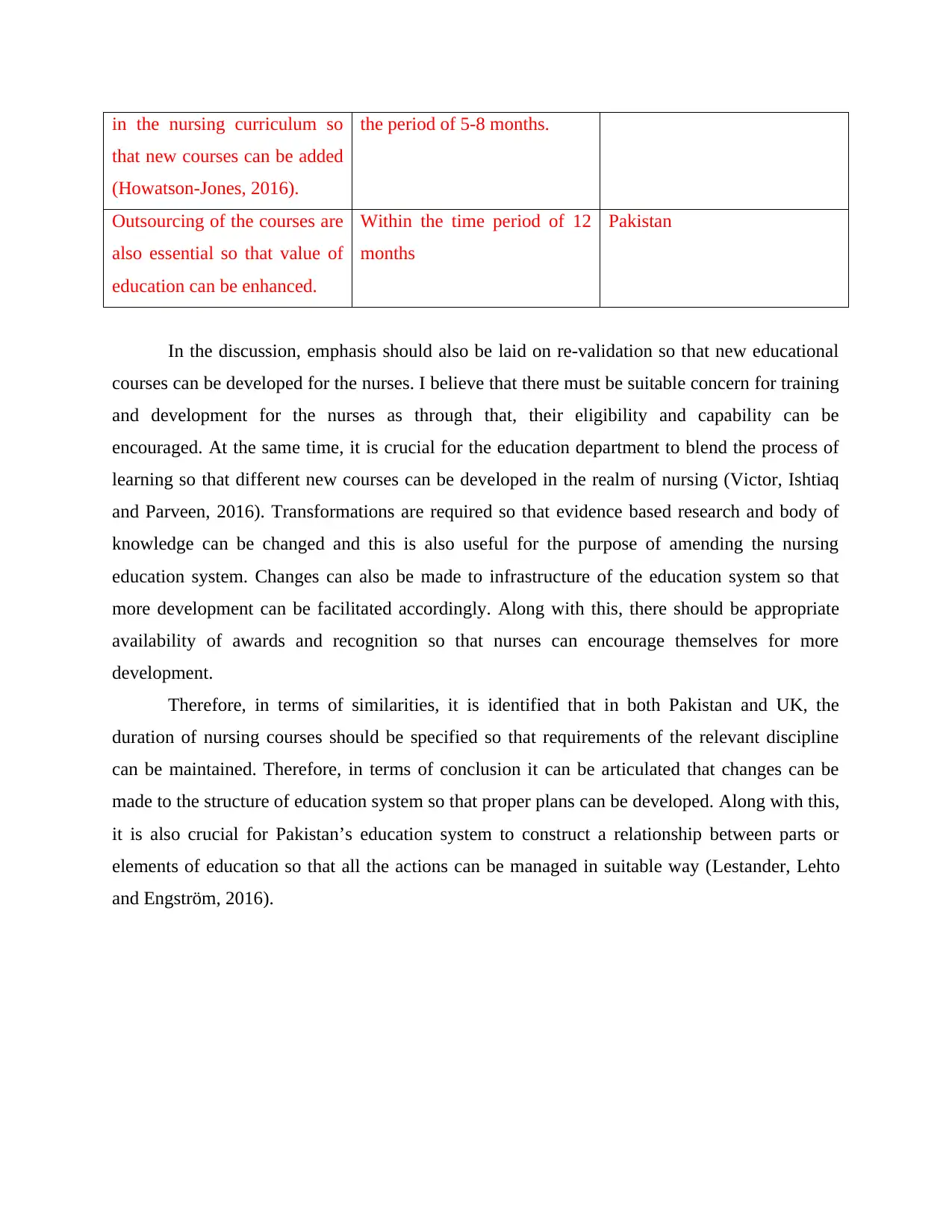
in the nursing curriculum so
that new courses can be added
(Howatson-Jones, 2016).
the period of 5-8 months.
Outsourcing of the courses are
also essential so that value of
education can be enhanced.
Within the time period of 12
months
Pakistan
In the discussion, emphasis should also be laid on re-validation so that new educational
courses can be developed for the nurses. I believe that there must be suitable concern for training
and development for the nurses as through that, their eligibility and capability can be
encouraged. At the same time, it is crucial for the education department to blend the process of
learning so that different new courses can be developed in the realm of nursing (Victor, Ishtiaq
and Parveen, 2016). Transformations are required so that evidence based research and body of
knowledge can be changed and this is also useful for the purpose of amending the nursing
education system. Changes can also be made to infrastructure of the education system so that
more development can be facilitated accordingly. Along with this, there should be appropriate
availability of awards and recognition so that nurses can encourage themselves for more
development.
Therefore, in terms of similarities, it is identified that in both Pakistan and UK, the
duration of nursing courses should be specified so that requirements of the relevant discipline
can be maintained. Therefore, in terms of conclusion it can be articulated that changes can be
made to the structure of education system so that proper plans can be developed. Along with this,
it is also crucial for Pakistan’s education system to construct a relationship between parts or
elements of education so that all the actions can be managed in suitable way (Lestander, Lehto
and Engström, 2016).
that new courses can be added
(Howatson-Jones, 2016).
the period of 5-8 months.
Outsourcing of the courses are
also essential so that value of
education can be enhanced.
Within the time period of 12
months
Pakistan
In the discussion, emphasis should also be laid on re-validation so that new educational
courses can be developed for the nurses. I believe that there must be suitable concern for training
and development for the nurses as through that, their eligibility and capability can be
encouraged. At the same time, it is crucial for the education department to blend the process of
learning so that different new courses can be developed in the realm of nursing (Victor, Ishtiaq
and Parveen, 2016). Transformations are required so that evidence based research and body of
knowledge can be changed and this is also useful for the purpose of amending the nursing
education system. Changes can also be made to infrastructure of the education system so that
more development can be facilitated accordingly. Along with this, there should be appropriate
availability of awards and recognition so that nurses can encourage themselves for more
development.
Therefore, in terms of similarities, it is identified that in both Pakistan and UK, the
duration of nursing courses should be specified so that requirements of the relevant discipline
can be maintained. Therefore, in terms of conclusion it can be articulated that changes can be
made to the structure of education system so that proper plans can be developed. Along with this,
it is also crucial for Pakistan’s education system to construct a relationship between parts or
elements of education so that all the actions can be managed in suitable way (Lestander, Lehto
and Engström, 2016).
Paraphrase This Document
Need a fresh take? Get an instant paraphrase of this document with our AI Paraphraser
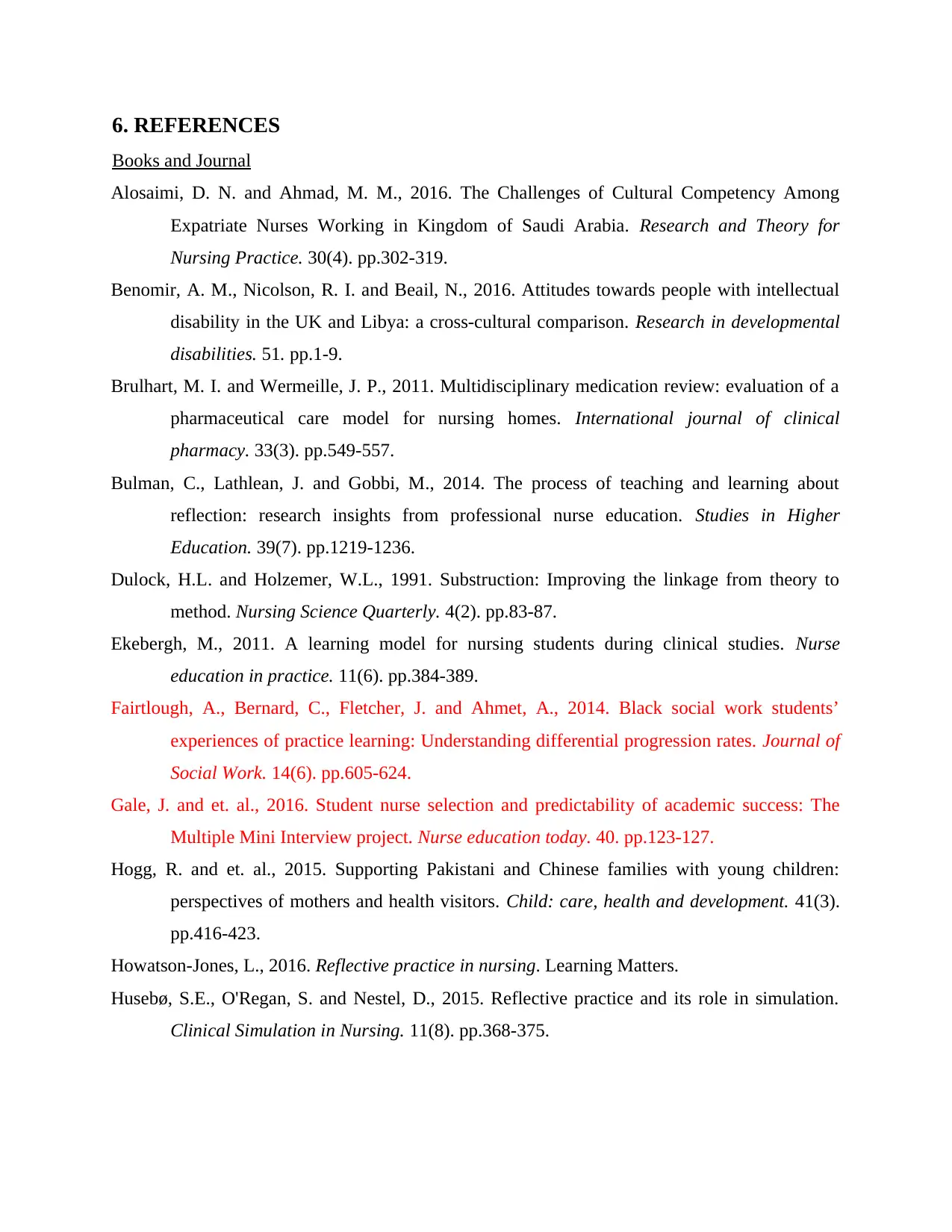
6. REFERENCES
Books and Journal
Alosaimi, D. N. and Ahmad, M. M., 2016. The Challenges of Cultural Competency Among
Expatriate Nurses Working in Kingdom of Saudi Arabia. Research and Theory for
Nursing Practice. 30(4). pp.302-319.
Benomir, A. M., Nicolson, R. I. and Beail, N., 2016. Attitudes towards people with intellectual
disability in the UK and Libya: a cross-cultural comparison. Research in developmental
disabilities. 51. pp.1-9.
Brulhart, M. I. and Wermeille, J. P., 2011. Multidisciplinary medication review: evaluation of a
pharmaceutical care model for nursing homes. International journal of clinical
pharmacy. 33(3). pp.549-557.
Bulman, C., Lathlean, J. and Gobbi, M., 2014. The process of teaching and learning about
reflection: research insights from professional nurse education. Studies in Higher
Education. 39(7). pp.1219-1236.
Dulock, H.L. and Holzemer, W.L., 1991. Substruction: Improving the linkage from theory to
method. Nursing Science Quarterly. 4(2). pp.83-87.
Ekebergh, M., 2011. A learning model for nursing students during clinical studies. Nurse
education in practice. 11(6). pp.384-389.
Fairtlough, A., Bernard, C., Fletcher, J. and Ahmet, A., 2014. Black social work students’
experiences of practice learning: Understanding differential progression rates. Journal of
Social Work. 14(6). pp.605-624.
Gale, J. and et. al., 2016. Student nurse selection and predictability of academic success: The
Multiple Mini Interview project. Nurse education today. 40. pp.123-127.
Hogg, R. and et. al., 2015. Supporting Pakistani and Chinese families with young children:
perspectives of mothers and health visitors. Child: care, health and development. 41(3).
pp.416-423.
Howatson-Jones, L., 2016. Reflective practice in nursing. Learning Matters.
Husebø, S.E., O'Regan, S. and Nestel, D., 2015. Reflective practice and its role in simulation.
Clinical Simulation in Nursing. 11(8). pp.368-375.
Books and Journal
Alosaimi, D. N. and Ahmad, M. M., 2016. The Challenges of Cultural Competency Among
Expatriate Nurses Working in Kingdom of Saudi Arabia. Research and Theory for
Nursing Practice. 30(4). pp.302-319.
Benomir, A. M., Nicolson, R. I. and Beail, N., 2016. Attitudes towards people with intellectual
disability in the UK and Libya: a cross-cultural comparison. Research in developmental
disabilities. 51. pp.1-9.
Brulhart, M. I. and Wermeille, J. P., 2011. Multidisciplinary medication review: evaluation of a
pharmaceutical care model for nursing homes. International journal of clinical
pharmacy. 33(3). pp.549-557.
Bulman, C., Lathlean, J. and Gobbi, M., 2014. The process of teaching and learning about
reflection: research insights from professional nurse education. Studies in Higher
Education. 39(7). pp.1219-1236.
Dulock, H.L. and Holzemer, W.L., 1991. Substruction: Improving the linkage from theory to
method. Nursing Science Quarterly. 4(2). pp.83-87.
Ekebergh, M., 2011. A learning model for nursing students during clinical studies. Nurse
education in practice. 11(6). pp.384-389.
Fairtlough, A., Bernard, C., Fletcher, J. and Ahmet, A., 2014. Black social work students’
experiences of practice learning: Understanding differential progression rates. Journal of
Social Work. 14(6). pp.605-624.
Gale, J. and et. al., 2016. Student nurse selection and predictability of academic success: The
Multiple Mini Interview project. Nurse education today. 40. pp.123-127.
Hogg, R. and et. al., 2015. Supporting Pakistani and Chinese families with young children:
perspectives of mothers and health visitors. Child: care, health and development. 41(3).
pp.416-423.
Howatson-Jones, L., 2016. Reflective practice in nursing. Learning Matters.
Husebø, S.E., O'Regan, S. and Nestel, D., 2015. Reflective practice and its role in simulation.
Clinical Simulation in Nursing. 11(8). pp.368-375.
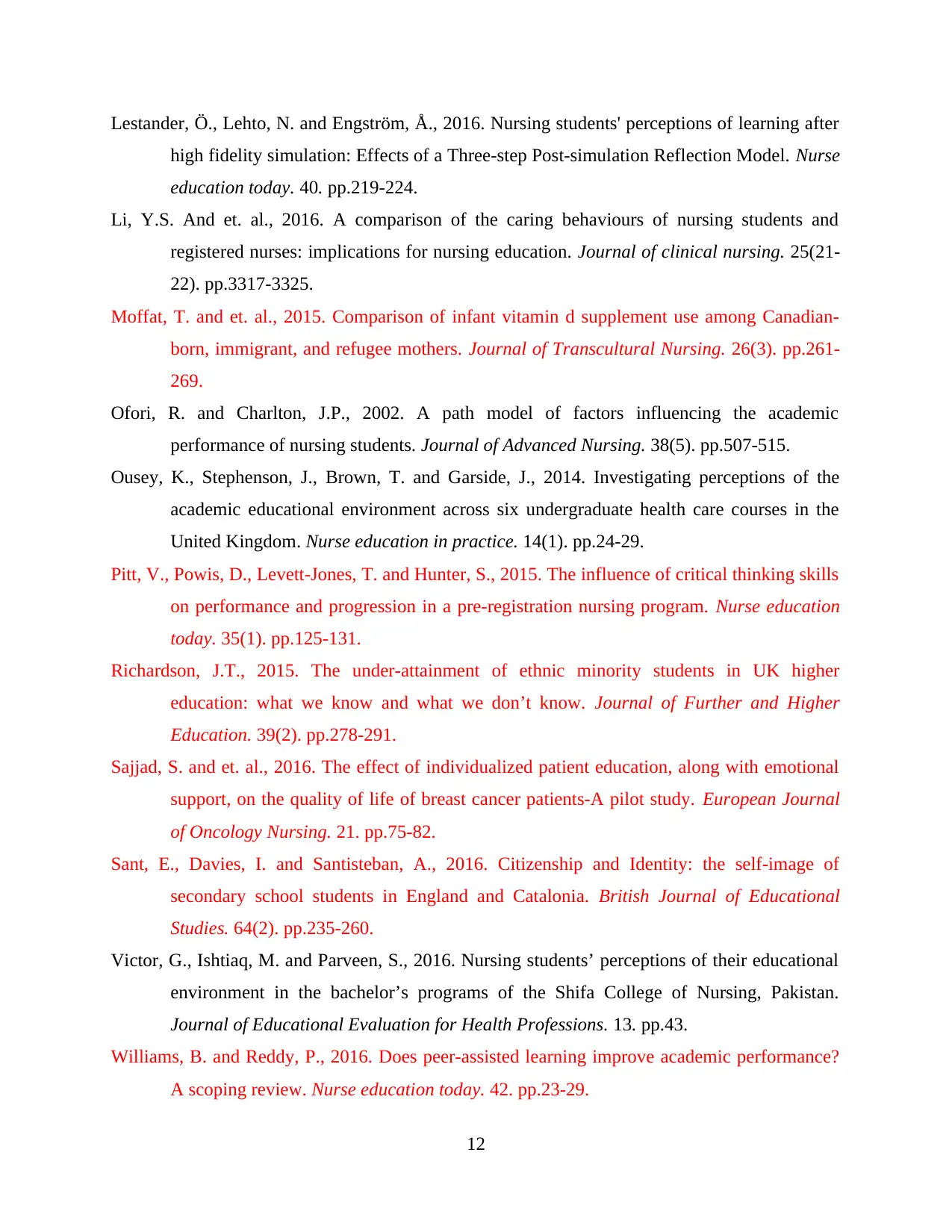
Lestander, Ö., Lehto, N. and Engström, Å., 2016. Nursing students' perceptions of learning after
high fidelity simulation: Effects of a Three-step Post-simulation Reflection Model. Nurse
education today. 40. pp.219-224.
Li, Y.S. And et. al., 2016. A comparison of the caring behaviours of nursing students and
registered nurses: implications for nursing education. Journal of clinical nursing. 25(21-
22). pp.3317-3325.
Moffat, T. and et. al., 2015. Comparison of infant vitamin d supplement use among Canadian-
born, immigrant, and refugee mothers. Journal of Transcultural Nursing. 26(3). pp.261-
269.
Ofori, R. and Charlton, J.P., 2002. A path model of factors influencing the academic
performance of nursing students. Journal of Advanced Nursing. 38(5). pp.507-515.
Ousey, K., Stephenson, J., Brown, T. and Garside, J., 2014. Investigating perceptions of the
academic educational environment across six undergraduate health care courses in the
United Kingdom. Nurse education in practice. 14(1). pp.24-29.
Pitt, V., Powis, D., Levett-Jones, T. and Hunter, S., 2015. The influence of critical thinking skills
on performance and progression in a pre-registration nursing program. Nurse education
today. 35(1). pp.125-131.
Richardson, J.T., 2015. The under-attainment of ethnic minority students in UK higher
education: what we know and what we don’t know. Journal of Further and Higher
Education. 39(2). pp.278-291.
Sajjad, S. and et. al., 2016. The effect of individualized patient education, along with emotional
support, on the quality of life of breast cancer patients-A pilot study. European Journal
of Oncology Nursing. 21. pp.75-82.
Sant, E., Davies, I. and Santisteban, A., 2016. Citizenship and Identity: the self-image of
secondary school students in England and Catalonia. British Journal of Educational
Studies. 64(2). pp.235-260.
Victor, G., Ishtiaq, M. and Parveen, S., 2016. Nursing students’ perceptions of their educational
environment in the bachelor’s programs of the Shifa College of Nursing, Pakistan.
Journal of Educational Evaluation for Health Professions. 13. pp.43.
Williams, B. and Reddy, P., 2016. Does peer-assisted learning improve academic performance?
A scoping review. Nurse education today. 42. pp.23-29.
12
high fidelity simulation: Effects of a Three-step Post-simulation Reflection Model. Nurse
education today. 40. pp.219-224.
Li, Y.S. And et. al., 2016. A comparison of the caring behaviours of nursing students and
registered nurses: implications for nursing education. Journal of clinical nursing. 25(21-
22). pp.3317-3325.
Moffat, T. and et. al., 2015. Comparison of infant vitamin d supplement use among Canadian-
born, immigrant, and refugee mothers. Journal of Transcultural Nursing. 26(3). pp.261-
269.
Ofori, R. and Charlton, J.P., 2002. A path model of factors influencing the academic
performance of nursing students. Journal of Advanced Nursing. 38(5). pp.507-515.
Ousey, K., Stephenson, J., Brown, T. and Garside, J., 2014. Investigating perceptions of the
academic educational environment across six undergraduate health care courses in the
United Kingdom. Nurse education in practice. 14(1). pp.24-29.
Pitt, V., Powis, D., Levett-Jones, T. and Hunter, S., 2015. The influence of critical thinking skills
on performance and progression in a pre-registration nursing program. Nurse education
today. 35(1). pp.125-131.
Richardson, J.T., 2015. The under-attainment of ethnic minority students in UK higher
education: what we know and what we don’t know. Journal of Further and Higher
Education. 39(2). pp.278-291.
Sajjad, S. and et. al., 2016. The effect of individualized patient education, along with emotional
support, on the quality of life of breast cancer patients-A pilot study. European Journal
of Oncology Nursing. 21. pp.75-82.
Sant, E., Davies, I. and Santisteban, A., 2016. Citizenship and Identity: the self-image of
secondary school students in England and Catalonia. British Journal of Educational
Studies. 64(2). pp.235-260.
Victor, G., Ishtiaq, M. and Parveen, S., 2016. Nursing students’ perceptions of their educational
environment in the bachelor’s programs of the Shifa College of Nursing, Pakistan.
Journal of Educational Evaluation for Health Professions. 13. pp.43.
Williams, B. and Reddy, P., 2016. Does peer-assisted learning improve academic performance?
A scoping review. Nurse education today. 42. pp.23-29.
12
⊘ This is a preview!⊘
Do you want full access?
Subscribe today to unlock all pages.

Trusted by 1+ million students worldwide
1 out of 13
Related Documents
Your All-in-One AI-Powered Toolkit for Academic Success.
+13062052269
info@desklib.com
Available 24*7 on WhatsApp / Email
![[object Object]](/_next/static/media/star-bottom.7253800d.svg)
Unlock your academic potential
Copyright © 2020–2026 A2Z Services. All Rights Reserved. Developed and managed by ZUCOL.





